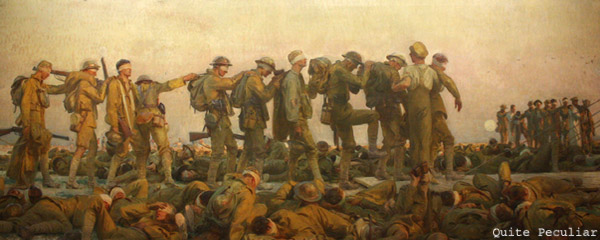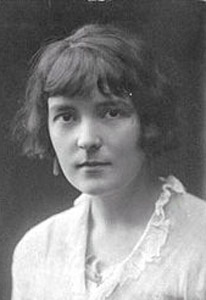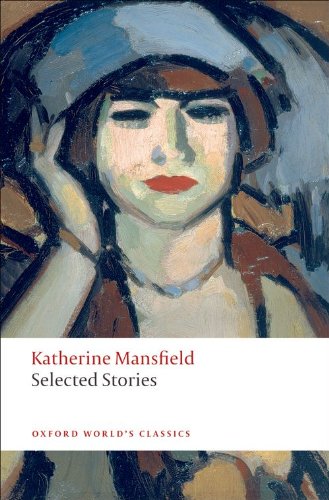
photo by Quite Peculiar
by Cath Humphris
My reading group and I have just been discussing ‘An Indiscreet Journey’ by Katherine Mansfield. It’s a bright, breezily narrated tale describing the journey a young woman makes across France to visit her lover, just behind the front-line during the early days of World War One. Like so much of Mansfield’s fiction, the story is a pen-portrait of an actual event, written soon after the visit took place, in 1915.
In this story, comic character studies, poetic descriptions and a clever digression from the apparent plot combine to entertain us and to provide and some enjoyable discussion. In some ways, this is one of her more accessible pieces; the narrator’s journey provides structure and the cameo portraits flesh out the story and provide colour and detail.
 Early in the story, there is a description of an old woman reading a letter from her soldier son, the first one she has received in months. The only detail Mansfield gives us of what he has to say is his request for string and handkerchiefs. This baffled our group. We began talking about the soldier with weeping eyes from later in the story. We knew that, when writing this story, Mansfield was staying at a flat in Paris, near a hospital treating soldiers who had been caught in gas attacks, and we concluded that this weeping soldier must have been caught in a gas attack too.
Early in the story, there is a description of an old woman reading a letter from her soldier son, the first one she has received in months. The only detail Mansfield gives us of what he has to say is his request for string and handkerchiefs. This baffled our group. We began talking about the soldier with weeping eyes from later in the story. We knew that, when writing this story, Mansfield was staying at a flat in Paris, near a hospital treating soldiers who had been caught in gas attacks, and we concluded that this weeping soldier must have been caught in a gas attack too.
When chemical weapons were first deployed, the armies were not prepared, and soldiers improvised gas masks with pads of urine soaked linen. At this point, one of our group informed us: ‘They tied string to each corner of the material and looped it around their ears.’
For me, this was a eureka moment. I saw beyond the words of the soldier’s letter, to the implications of the way the mother reads it:
Slowly, slowly she sipped a sentence, and then looked up and out of the window, her lips trembling a little, and then another sentence, and again the old face turned to the light, tasting it…
The story opened out, as if the detail of Mansfield’s story were only a shadow of a much bigger narrative. How terrible a letter it must have been for a mother to receive, and how discreetly Mansfield has conveyed this contrast between our naïve narrator and the landscape she travels through.
On some level, a story is always a piece of social history. We can choose to explore or ignore this aspect, and not every story is worth exploring in this way. But to spend a little time on this one is to see what was happening in the wider world at that moment.
Mansfield’s way with words still feels fresh; the sentences are tightly formed, concise, but full of detail. I suppose I could have just skipped past the boy with ‘his sabots tied to his back with a piece of string’, and the soldier ‘whose kepi had come out of a wet paper cracker’. Except that, in a short story, every word counts.
Halfway along her journey, Mansfield’s narrator has to change trains:
So I followed the crowd.
“Your passport, Mademoiselle…”
“We, Sir Edward Grey…”
 It’s a tiny detail, and a phrase a modern reader might stumble over. Yet Mansfield’s contemporaries would have understood that the British Foreign Secretary’s signature on her passport creates an ironic contrast to the illicit purpose of her journey. This contrast becomes especially apparent in another three paragraphs, where Mansfield shows us the ‘unfamiliar letter in the familiar handwriting’, which the narrator’s lover has provided so that she can fool the officials. This is a story of another country as well as another time, and I was glad that my copy of ‘An Indiscreet Journey’ came with notes that explained the many subtle references Mansfield makes.
It’s a tiny detail, and a phrase a modern reader might stumble over. Yet Mansfield’s contemporaries would have understood that the British Foreign Secretary’s signature on her passport creates an ironic contrast to the illicit purpose of her journey. This contrast becomes especially apparent in another three paragraphs, where Mansfield shows us the ‘unfamiliar letter in the familiar handwriting’, which the narrator’s lover has provided so that she can fool the officials. This is a story of another country as well as another time, and I was glad that my copy of ‘An Indiscreet Journey’ came with notes that explained the many subtle references Mansfield makes.
This is, after all, a story of subtleties; a naïve and rather shallow narrator indiscreetly reveals a picture of France and the war, which is at odds with the official version of events. She meets her lover at the end of her train journey, yes, but the final part of the story has our narrator hiding with three soldiers in ‘a dark smelling scullery’, taking an illegal drink of Mirabelle to test whether it tastes the same as whisky: ‘The soldier’s happy voice trickled through the dark. “Hasn’t it got a taste of excellent – ex-cellent whisky?”’ Now that has to be an ending worth thinking about.
As we head for the hundred year anniversary of the start of The Great War, there is certain to be a lot of re-examination of the literature of the period. Here’s a suggestion for an early start that you, or your reading group, might make.

